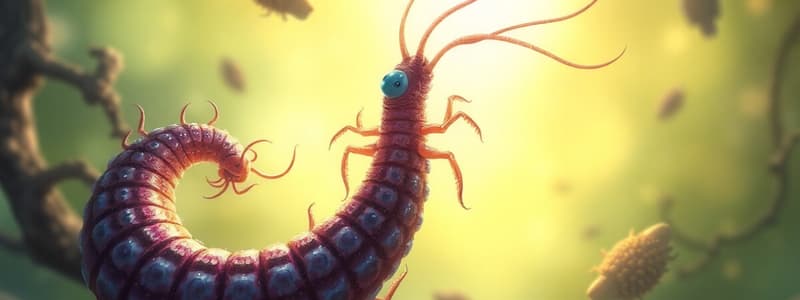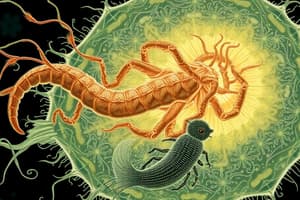Podcast
Questions and Answers
What is the first stage of life in the outlined life cycle?
What is the first stage of life in the outlined life cycle?
Which of the following is a route of transmission for the organism described?
Which of the following is a route of transmission for the organism described?
What stage follows the egg stage in the life cycle?
What stage follows the egg stage in the life cycle?
Which statement is accurate regarding the stages of life mentioned?
Which statement is accurate regarding the stages of life mentioned?
Signup and view all the answers
In the described life cycle, which stage is essential for transmission?
In the described life cycle, which stage is essential for transmission?
Signup and view all the answers
Which organism is associated with causing amoebic dysentery?
Which organism is associated with causing amoebic dysentery?
Signup and view all the answers
What disease is primarily associated with Giardia lamblia?
What disease is primarily associated with Giardia lamblia?
Signup and view all the answers
Which of the following vectors is responsible for the transmission of malaria?
Which of the following vectors is responsible for the transmission of malaria?
Signup and view all the answers
Which organism is known to cause balantidial dysentery?
Which organism is known to cause balantidial dysentery?
Signup and view all the answers
What condition is Trichomonas vaginalis primarily associated with in women?
What condition is Trichomonas vaginalis primarily associated with in women?
Signup and view all the answers
Study Notes
Introduction to Parasitology
- Parasitology covers protozoa and helminths
- Lectures 17 & 18
- Presented by Dr. Sozan Mohamed Fadl, Head of Microbiology & Immunology Unit
Definitions
- Parasites: Protozoa, helminths, and arthropods
- Types of hosts:
- Definitive host: Sexual cycle
- Intermediate host: Asexual cycle
- Infective stage: The stage that infects a host
- Diagnostic stage: The stage found in samples for diagnosis
Protozoa
- Unicellular, eukaryotic organisms
- Measured in microns (2-150 µm)
- Primarily asexual reproduction (binary fission), sometimes sexual
- Two main stages:
- Cyst: Dormant, non-motile, survives in the environment
- Trophozoite: Motile, actively feeding, and reproducing
Classification of Protozoa
- Amoeba (motile by pseudopodia):
- Forms: Cyst and trophozoite
- Disease: Amoebic dysentery
- Transmission: Fecal-oral
- Entamoeba histolytica: Fecal-oral
- Flagellates (motile by flagella):
- Forms: Cyst and trophozoite
- Giardia lamblia: GIT (diarrhea)
- Trichomonas vaginalis: Vaginitis, urethritis
- Transmission: Fecal-oral
- Ciliophora (motile by cilia):
- Forms: Cyst & trophozoite
- Balantidium coli: Balantidial dysentery
- Transmission: Fecal-oral
- Sporozoa (obligate intracellular parasites):
- Forms: Many
- Plasmodium: Malaria
- Transmission: Anopheles mosquitoes
- Toxoplasma: Definitive host cats
Helminths
- Multicellular organisms
- Stages of life:
- Adult worms
- Larvae
- Eggs
- Routes of transmission:
- Ingestion of eggs (fecal-oral)
- Ingestion of larvae (undercooked meat)
- Skin penetration by larvae
- Definitive host: Harbors the adult worm
- Types: Flat (cestodes, trematodes) and Round (nematodes)
Cestodes (Tapeworms)
- Flat, segmented, hermaphrodites
- Length range: 2mm - 15 meters
- Body parts:
- Scolex: Organ of fixation (suckers/hooks)
- Neck
- Segments: Contain male and female sexual organs
- Examples:
- Taenia saginata (beef tapeworm)
- Taenia solium (pork tapeworm)
- Diphyllobothrium latum (fish tapeworm)
- Infective stage: Larvae
- Diagnostic stage: Eggs
Trematodes (Flukes)
- Flat, leaf-shaped, non-segmented, unisexual
- Examples:
- Schistosoma mansoni: Intestinal bilharziasis
- Schistosoma haematobium: Urinary bilharziasis
- Infective stage: Larvae
- Diagnostic stage: Eggs
- Intermediate host: Snails
Nematodes
- Cylindrical, unisexual worms
- Examples:
- Ascaris lumbricoides: Small intestine, egg
- Enterobius vermicularis: Large intestine, egg, perianal itching
- Ancylostoma duodenale: Larvae, blood loss -> anemia
- Trichinella spiralis: Eating encysted larvae in undercooked pork, larvae
Transmission, Disease & Diagnostic/Infective Stage Summary
- Table summarized data across different parasite types (Taenia saginata, Taenia solium, Diphyllobothrium latum, Schistosoma, Ascaris lumbricoides, Enterobius vermicularis, Ancylostoma duodenale, Trichinella spiralis)
Studying That Suits You
Use AI to generate personalized quizzes and flashcards to suit your learning preferences.
Related Documents
Description
Explore the fascinating world of parasitology in this quiz covering lectures 17 and 18 by Dr. Sozan Mohamed Fadl. Learn about protozoa, helminths, their classifications, life cycles, and how they interact with their hosts. Test your knowledge on the definitions, types of parasites, and key concepts discussed in the lectures.



